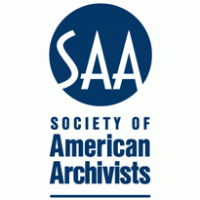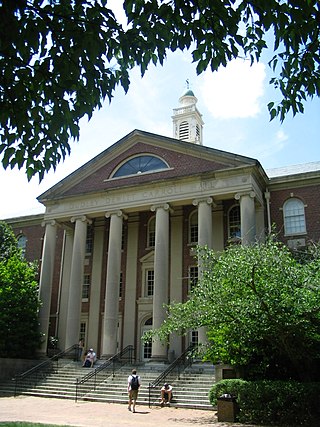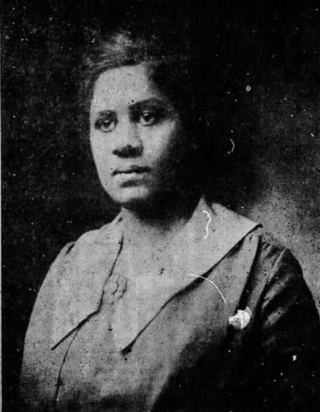
Richard A. Vinroot is an American politician and attorney from Charlotte, North Carolina. He served as the 52nd Mayor of Charlotte from 1991 to 1995. Vinroot ran unsuccessfully for Governor of North Carolina in 1996, 2000 and 2004. The City of Charlotte's Richard Vinroot International Achievement Award is named in his honor.
The American Library Association (ALA) is a nonprofit organization based in the United States that promotes libraries and library education internationally. It is the oldest and largest library association in the world.

Rollins College is a private college in Winter Park, Florida. It was founded in November 1885 and has about 30 undergraduate majors and several master's programs. It is Florida's fourth oldest post-secondary institution.

The Society of American Archivists is the oldest and largest archivist association in North America, serving the educational and informational needs of more than 5,000 individual archivist and institutional members. Established in 1936, the organization serves upwards of 6,200 individual and member institutions.

The Medical Library Association (MLA) is a nonprofit educational organization with more than 3,400 health-sciences information professional members.

Candler School of Theology is one of seven graduate schools at Emory University, located in metropolitan Atlanta, Georgia. A university-based school of theology, Candler educates ministers, scholars of religion and other leaders. It is also one of 13 seminaries affiliated with the United Methodist Church.

The Dialectic and Philanthropic Societies, Inc. commonly known as DiPhi or The Societies, are the original collegiate debating societies at the University of North Carolina at Chapel Hill, and together comprise the oldest student organization at the University, as well as the oldest public student organization in the United States. During the academic year, the Societies hold regular meetings at 7:30 PM on Mondays in the Dialectic Chamber at the top of the New West Building. The Societies also hold occasional social events in the Philanthropic Chamber at the top of New East Building.

Sue Bailey Thurman was an American author, lecturer, historian and civil rights activist. She was the first non-white student to earn a bachelor's degree in music from Oberlin College, Ohio. She briefly taught at the Hampton Institute in Virginia, before becoming involved in international work with the YWCA in 1930. During a six-month trip through Asia in the mid-1930s, Thurman became the first African-American woman to have an audience with Mahatma Gandhi. The meeting with Gandhi inspired Thurman and her husband, theologian Howard Thurman, to promote non-violent resistance as a means of creating social change, bringing it to the attention of a young preacher, Martin Luther King Jr. While she did not actively protest during the Civil Rights Movement, she served as spiritual counselors to many on the front lines, and helped establish the first interracial, non-denominational church in the United States.
The Commission on Interracial Cooperation (1918–1944) was an organization founded in Atlanta, Georgia, December 18, 1918, and officially incorporated in 1929. Will W. Alexander, pastor of a local white Methodist church, was head of the organization. It was formed in the aftermath of violent race riots that occurred in 1917 in several southern cities. In 1944 it merged with the Southern Regional Council.

The UNC Hussman School of Journalism and Media is a nationally accredited professional undergraduate and graduate level journalism school at the University of North Carolina at Chapel Hill. The school, founded in 1950, is ranked competitively among the best journalism schools in the United States. The school offers undergraduate degrees in media & journalism as well as advertising & public relations. It offers master's degrees in journalism, strategic communication, and visual communication and doctoral degrees in media & communication.

Charlemae Hill Rollins was a pioneering librarian, writer and storyteller in the area of African-American literature. During her thirty-one years as head librarian of the children's department at the Chicago Public Library as well as after her retirement, she instituted substantial reforms in children's literature.
The North Carolina Commission on Interracial Cooperation was a state affiliate of the Commission on Interracial Cooperation, established in 1921 to improve race relations by changing racial attitudes and alleviating injustice. Activities included creating pamphlets, radio programs, press releases, and holding local meetings and conferences. The NCCIC was initially made up of a group of prominent individuals, both African American and white. Chairs of the NCCIC included William Louis Poteat, Howard Odum, and Edwin Pennick. Directors included L. R. Reynolds, Earnest Arnold, and Cyrus M. Johnson.
James Gamble Rogers II was a celebrated American architect practicing primarily in Winter Park, Florida in the middle years of the twentieth century. He is noted for suavely elegant residential and commercial work, in the Spanish Revival, Mediterranean Revival, French Provincial, and Colonial Revival styles.

Crystal Bird Fauset was a civil rights activist, social worker, race relations specialist, and the first female African American state legislator elected in the United States, based in Philadelphia, Pennsylvania.
The Winter Park Library is a 501(c)(3) nonprofit lending library in Winter Park, Florida.

Paul North Rice was an American librarian who served as Chief of the Reference Department of the New York Public Library, Executive Secretary of the Association of Research Libraries and President of the American Library Association.

Ora Brown Stokes Perry (1882–1957) was an American educator, probation officer, temperance worker, suffragist, and clubwoman based in Richmond, Virginia.
Richard Walter Thomas is a retired African-American professor of Michigan State University known for his work in black issues and race relations. He has published a number of scholarly works, his poetry has been gathered in various anthologies, and he has given a variety of talks, workshops, and interviews on issues of race and race relations.

Mount Vernon Unitarian Church (MVUC) is a Unitarian Universalist church in the Fort Hunt area of Fairfax County, Virginia and a member of the Unitarian Universalist Association (UUA). It meets on a portion of the historic Hollin Hall estate. It is a long-time "welcoming congregation," which means it is open and affirming to all. The church has a long history of supporting LGBTQ rights and is an active social justice congregation.
Lottie B. Scott is an American civic leader and civil rights advocate who is a past president and co-founder of the NAACP branch in Norwich, Connecticut.